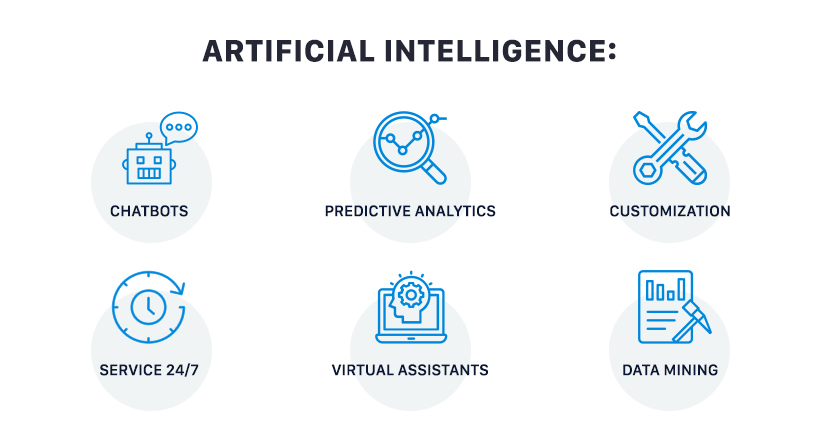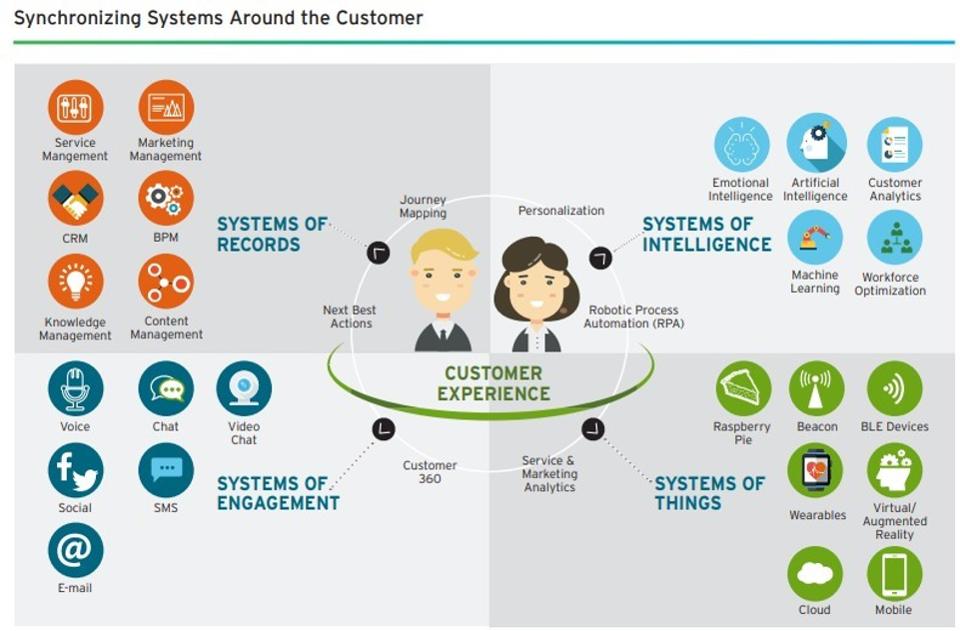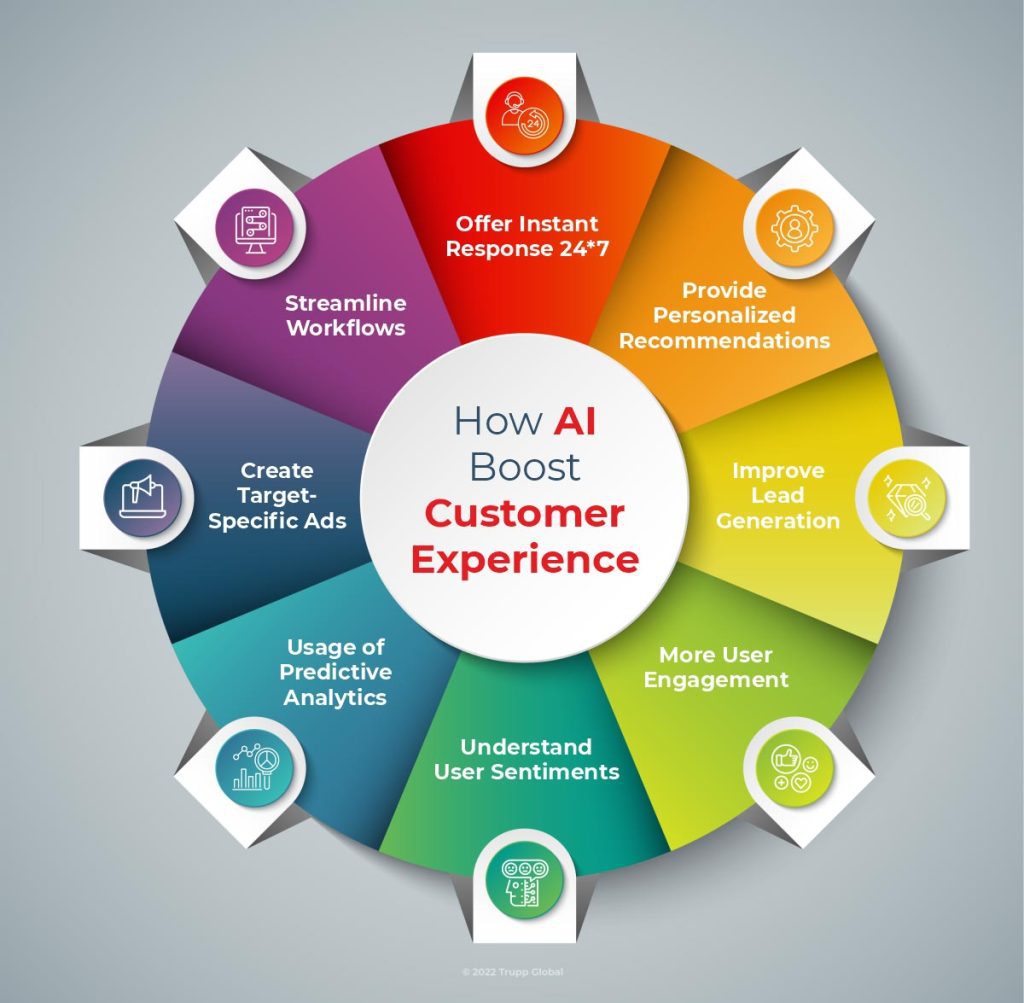Success is now more heavily influenced by customer satisfaction than it used to be by product or price. Artificial intelligence (AI) is your most potent weapon if customer experience (CX) is the new arena of conflict.
More and more businesses are learning how AI can enhance customer experience and satisfy contemporary consumer demands.
The use of AI in businesses has increased by 270 percent in the last 4 years, according to Gartner. It is obvious that AI technology is not a fad for the future. You may utilize it right now to provide happy client experiences.
This article can answer your questions about what CX-centered AI is and how it can help your company.

The state of customer experience today
Today’s businesses are fully cognizant of the importance of a positive client experience to their success. To create an intelligent, practical, and informed CX at any stage during the client journey, they are considering integrating Artificial Intelligence (AI).
By using it to quickly access insights and automate campaigns and processes, more than 50% of the companies surveyed are already putting AI to use for improving the customer experience.
Because AI has the capacity to collect and interpret vast volumes of data from various sources, including human actions and emotions, it offers a tremendous deal of potential for improving customer experience (CX).
Marketing and data professionals have benefited greatly from artificial intelligence (AI).
Richer insights, increased ROI, and better decision making in close to real time have all been made possible by the ability to analyze and process millions of data points in a matter of seconds.
The creation of new products and services aimed at delighting customers and increasing the effectiveness of internal teams has led to an expansion in how organizations are utilizing AI throughout their operations.
85 percent of firms are somewhat or extremely likely to include customer analytics employing AI/ML and predictive capabilities into their data plans throughout 2022, according to Treasure Data research on the maturity of customer data.
Related Reading: Contextual Commerce – The Future in Digital-Centric Ecommerce
What are the trends for AI in Customer Experience?
AI is also having an impact elsewhere. We asked marketing executives to discuss how AI has changed their perspectives on marketing and how the technology is reshaping the sector. Here is what we found:
1. AI Unlocks New Perspectives
AI can quickly provide insight, but it can also highlight subtleties in the data that could have gone overlooked in the past.
Without the use of cutting-edge technology, this skill enables firms to discover patterns, narrow gaps, and identify target audiences in a way they may not have been able to achieve before.
According to us, with the use of AI, data professionals can now find patterns and correlations that were previously concealed.
This enables them to decide on the best ways to target marketing campaigns and streamline client journeys.
2. AI Connects First, Second, and Third-party Data
Today, more contact points than ever before are used to collect data.
AI can rapidly collect, combine, and analyze data from formerly dispersed sources to maintain unified customer profiles updated and accurate in almost real-time when used in conjunction with technologies like a customer data platform.
We at Kilowott think there’s a lot of different ways to use it – the idea that you can teach the machine to learn and figure out patterns that you and I wouldn’t be able to figure out.
In the healthcare industry, we have a ton of data, both first-party and third-party.
We believe it is crucial to be able to let AI and machine learning decide what patterns they are seeing.
Related Reading: Shoppable Media – What is it and how it leverages social commerce
3. AI Helps Marketers Understand Customers
To really understand clients and their individual customer journeys, various data pieces must be connected.
If we have a good understanding of who our customer is, and we understand the interactions that that person has had, whether it’s within our ecosystem, or outside of our ecosystem, if you can marry who that person is, and what about them you need to know, with those external data, you’re able to start doing the magic of being able to talk to that person in the right context at the right channel at the right time, with the right message – and that will drive up customer satisfaction.
4. AI Allows For New Customer Experiences
According to Instrumental’s CEO and co-founder Gauri Manglik, improvements extend beyond texting.
Understanding customer preferences and previous interactions can also assist marketers in determining the best course of action to take or which goods or services to suggest to various customers. This can raise customer lifetime value, loyalty, and retention.
“As an illustration, consider a business that offers goods at various pricing points. People who seek a premium product but are willing to pay less may be the target market for one product. Another may be made for those who value price more than quality, according to Manglik. These businesses “may employ artificial intelligence to suggest which customers should receive certain products based on their tastes, age range, and other factors—and assure that all customers get exactly what they want out of each purchase.”
Customers are receptive to recommendations generated by AI.
AI in marketing found that 51% of respondents prefer entertainment recommendations based on search history, while 58% want businesses to provide product recommendations based on their search history.

5. AI Humanizes Marketing with Personalization at Scale
If you’re doing it manually, getting to know a large customer base personally seems like an insurmountable effort.
But AI enables data teams and marketers to expand their reach while also drilling down to create contextual experiences at scale.
Chloe Addis, head of marketing at Headley Media, stated that “AI will enable marketers to manage incredibly individualized targeting on a huge scale.”
Brands will be able to design streamlined, customized customer experiences across platforms that are perfectly matched to each individual client and their needs, then sell to them at the ideal moment.
In a way, Addis continues, AI is assisting marketers in adopting a more “human” strategy.
It’s almost ironic, she noted, that many of the upcoming technical developments will be utilized to humanize marketing communications and customize customers’ experiences with major brands.
6. AI Makes Teams (and Experiences) More Efficient
Chatbots are a fantastic way to humanize marketing through technology. Chatbots may improve consumer experiences while also increasing the effectiveness of sales, marketing, and customer support teams, according to Boris Jabes, CEO and co-founder of Census.
According to Jabes, “many firms currently use chatbots to automate customer service jobs, such as answering frequent questions, offering customer assistance, and accepting purchases – and even more difficult ones like fraud detection or financial analysis.”
Customers can receive the support or answers they require right away because these bots can complete these activities far more quickly than people can.
Additionally, since bots are available around-the-clock, organizations may offer customer care whenever needed.
Related Reading: Ecommerce Analytics: Leveraging Data To Unlock Online Sales

What are the benefits of investing in AI for Customer Experience?
By 2035, Accenture expects AI to treble economic growth rates.
Companies who use AI have a competitive advantage over those that have not yet embraced its advantages as personalisation, deeper engagement, and proactive service continue to revolutionize the consumer experience.
Businesses that are forward-thinking have already broken the ice by implementing AI for customer experience trends. There are numerous instances where AI helps users book tickets, purchase goods, place food orders, make reservations, schedule appointments, etc.
Following are some powerful advantages of artificial intelligence for customer experience:
1. Higher Business Revenue
AI can help with sales funnel optimization and customized marketing techniques. It aids the sales team in developing pertinent tactics and concentrating on areas that need improvement in order to increase their sales pipelines.
2. Automate Customer Support
A customer care chatbot deployed across all modes of contact can assist you in providing immediate answers to client FAQs, reducing response times and customer attrition.
3. Boost Customer Satisfaction
When the support personnel is busy or unavailable, utilizing AI’s power enables individualized assistance to be provided around-the-clock. Customer satisfaction is increased when they receive quicker service when they need it.
Related Reading: Global Commerce – How to Strategize For International Ecommerce
What are some examples of achieving better customer experience with AI?
There are several ways artificial intelligence may improve CX. To make daily chores easier, it increases automated support and simplifies operations.
58% of consumers indicated they would use AI to save time, and 56% said they would use it to save money, according to Gartner.
The more time they save, the more likely they are to buy anything, and the more money they save, the more likely they are to come back to your store and make another purchase.
Realize the value of CX knowledge for overall business growth. Here are a few ways that embracing the AI movement could make your business successful.
– 24 hour, immediate response
– Provide individualized advice
– Raise sales conversion rates
– Using predictive analytics, key insights can be gained
– User interaction with text, speech, and images
– Improved comprehension of user sentiment
Kilowott empowers companies from across the retail and ecommerce sector, to offer everything from online webstores to tracking solutions that can bolster online selling of your products.
Need help? Let’s talk






